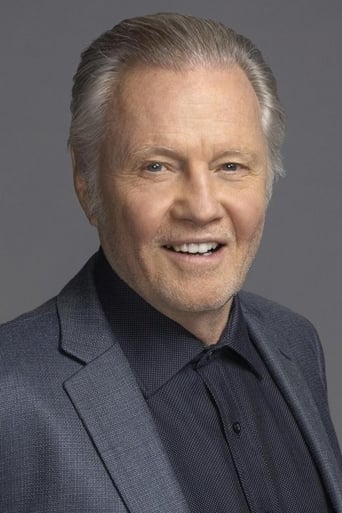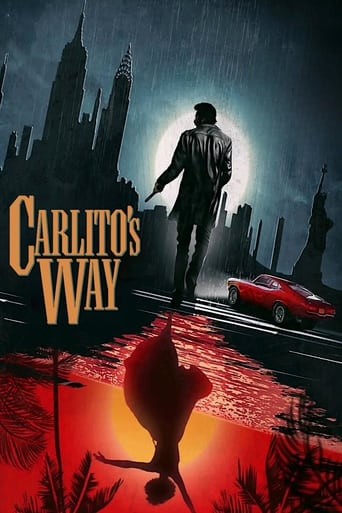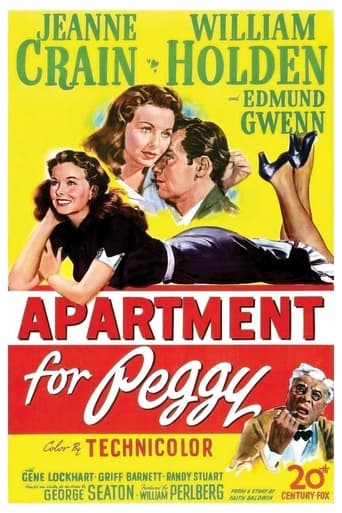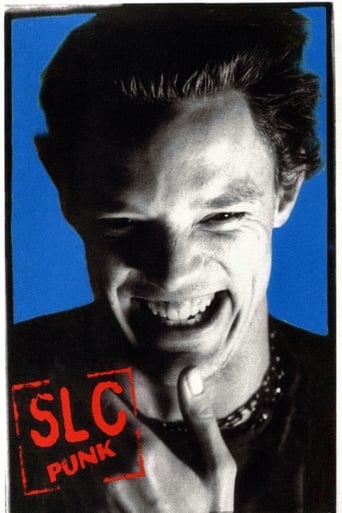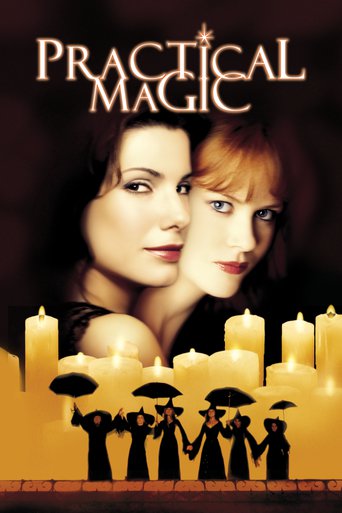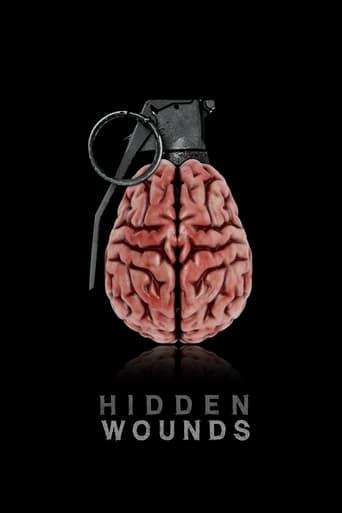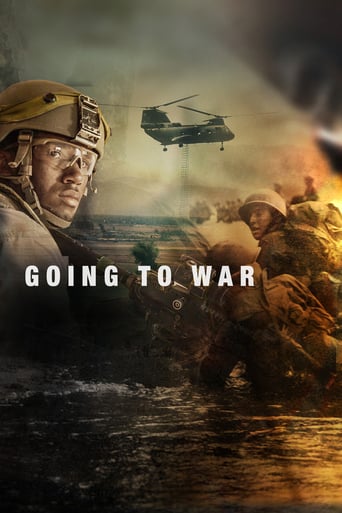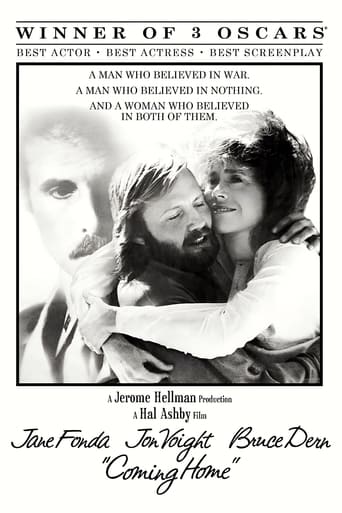
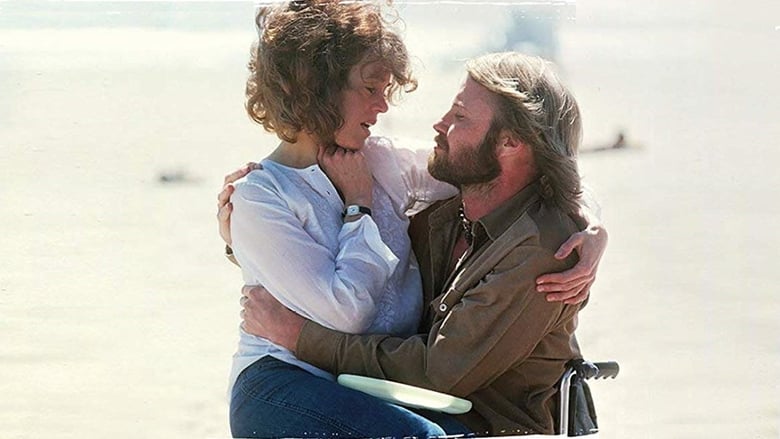
Coming Home (1978)
The wife of a Marine serving in Vietnam, Sally Hyde decides to volunteer at a local veterans hospital to occupy her time. There she meets Luke Martin, a frustrated wheelchair-bound vet who has become disillusioned with the war. Sally and Luke develop a friendship that soon turns into a romance.
Watch Trailer
Cast
Similar titles
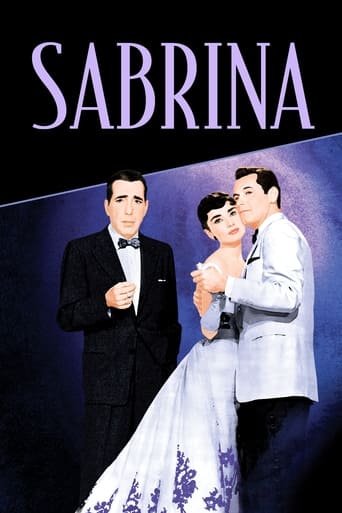

Reviews
Redundant and unnecessary.
The film makes a home in your brain and the only cure is to see it again.
This is a coming of age storyline that you've seen in one form or another for decades. It takes a truly unique voice to make yet another one worth watching.
Although I seem to have had higher expectations than I thought, the movie is super entertaining.
RELEASED IN 1978 and directed by Hal Ashby, "Coming Home" is a drama taking place on the shores of Southern California about a lonely Captain's wife (Jane Fonda) who befriends a bohemian, Vi (Penelope Milford), when her husband (Bruce Dern) is deployed to 'Nam in 1968. She volunteers at a Veteran's hospital where she meets a bitter paraplegic, who happens to be an old classmate (Jon Voight). Robert Carradine plays Vi's brother, who suffers PTSD.Like all great dramas, "Coming Home" is realistic and takes its time to establish the characters and their situations. The emotions run the gamut of the human experience. The performances by the principals are superlative. The outstanding soundtrack includes twenty hits from the late 60s by artists like The Stones, The Beatles, Hendrix, Buffalo Springfield, Joplin, The Chambers Brothers, Jefferson Airplane, Dylan and so on. The movie's not so much "anti-war" as it is just depicting the way it was for combat Vets after coming home.THE FILM RUNS 127 minutes and was shot in Manhattan Beach, near Los Angeles. WRITER: Waldo Salt & Robert C. Jones based on Nancy Dowd's story.GRADE: A
This is a hell of a movie. Not a lot of action, only relations between men and women. And the suffering from decisions of governments, merely based on balance of power, to sacrifice life of boys without them being dead.I really despise looking Anti-War movies, because most of them shows the actions of war, and most of the time, I meet some military guys who enjoy that as a kind of voyeurism.This movie took the choice of not showing a single act of war, and it is the best choice.The message is so strong, even 40 years later, it should keep anybody to go to war for any reason, because there are none.Watch it! Feel it! Understand it! A masterpiece.
A flawed film. But also a film of tremendous grace, power, and originality. The flaws; Bruce Dern's character is criminally underdeveloped, and comes off more as a cliché than the other two leads, which damages the power of the films climax. For the film to fully work, we have to believe that Fonda would consider staying with this man, who starts as a martinet, and ends up frightening unbalanced, and dangerous, while Jon Voight seems a near saint. Fonda's character also starts off as a cliché, but deepens quickly as the film goes on. And some of the use of 60s rock songs are bit too on the nose, their comments a bit too obvious. Yet all that said, there is also magic here; in Jon Voight's magnificent performance – arguably the best he's done, in Jane Fonda's fine work. In the feeling of almost documentary realism in the moments of their relationship, in the radical (especially for it's time) dealing with sex and a paraplegic, and the scars of Viet Nam of individuals and a nation. Haskel Wexler's cinematography is also very strong. This is a film who's special moments so stick with me (e.g. Voight's speech to a bunch of high school kids) that I can look past the flies in the ointment.
Not all wars were dealt with the same way by cinema, and I don't mean just in their reflection of public opinion. In World War Two Hollywood got fully involved in the propaganda movement, and movies made after the war looked mainly at reliving the heroism involved. By the height of the Vietnam war, Hollywood was more independent and the war was widely criticised. During wartime this was manifested in numerous examples of veiled anti-militarist commentary, but very little actual reference to the conflict itself. And even when the war finished, it was a couple of years before pictures about it started to be made, but when they did, the Vietnam war movie soon became a prolific subgenre in its own right. Coming Home was one of the earliest, and yet it remains one of the most honest and heartfelt. Made the same year as Oscar-sweeper The Deer Hunter, it dispenses with that picture's before-during-after structure, to focus purely on the aftermath.Coming Home has as its director the very direct and compassionate Hal Ashby. I don't know how Ashby would have handled a Vietnam action movie – he never really did anything so ostentatious – but his total focus here on the humanity of the situation makes the lack of some contextualising violence superfluous. Ashby does not use many extreme close-ups, but he is a master of a kind of shot that nevertheless makes a character dominate the screen, with Spartan backgrounds and few camera movements. He doesn't draw our attention too much to the undignified position of the veterans, and their wheelchairs seem almost coincidental in the shot, although he has a great knack of dropping in a reminder so subtly it looks unintentional. For example, there's a shot where Jane Fonda is wheeling along a paraplegic who is complaining about the lack of information he's been given about his situation, and just as he comes fully into view, we see her stick a "bowel and bed" sign on the end. Zoom lenses were overused in the 70s and their use often looks corny today, but Ashby spares them for moments when you are so totally absorbed in the scene you are unlikely to notice. There are a lot of reaction shots in Coming Home, often while a character continues speaking offscreen, for example during the pool-playing veterans conversation in the first scene, and Ashby really helps to make this a picture about reactions and reflections.This straightforward focus on people pays off in the superb acting performances. What's great about Jon Voight and Jane Fonda, is that their performances are so uncomplicated, unlike much of what passed for good acting at the time. They don't have the obviously improvised look of Robert De Niro or the deliberate gestures and mannerisms of Meryl Streep. They simply believe in their characters and act out the script. The result is that they come across as totally believable. Voight brings through such an amiable personality, and Fonda has such honesty to her every action, that we forget the potential awkwardness or inequality of a relationship between a disabled person and an able-bodied one, and simply see two people falling in love. The only over-the-top performance in the picture is that of Bruce Dern, but it works very well to make this character slightly ridiculous, giving a quality to his rage that is pathetic rather than truly threatening.And after all it is Bruce Dern who is really the most tragic figure of this story. The screenplay by Nancy Dowd, Waldo Salt and Robert C. Jones is bookended by his leaving for Vietnam and his coming home. In the opening credits, the recording of The Rolling Stones' Out of Time seems to imply that he's the "poor, deluded" one. He may be a bit of a pompous fool, and the antagonist as far as Fonda and Voight's affair goes, and yet he becomes curiously sympathetic. While Voight's character makes his psychological recovery, Dern becomes a victim, not so much of the war but of military life.It's this kind of humanist insight that makes Coming Home what it is. In 1950 there was a movie with a similar plot called The Men, which looked very frankly at the harrowing circumstances of a man made paraplegic in World War Two. Coming Home however does not go into the gory details of disability or even particularly highlight the indignity of Voight's condition. The heart of the movie is in scenes like Voight crying to Robert Carradine's guitar playing, or getting some cheeky kids to help him with his shopping. Even the scenes of protest against the war are not nearly as polemical as in Born on the Fourth of July, but more a sombre reflection of the times. It is less like The Men, and more like Vietnam's version of The Best Years of Our Lives. It's a picture about social cohesion, and the healing of wounds after conflict has ended.

